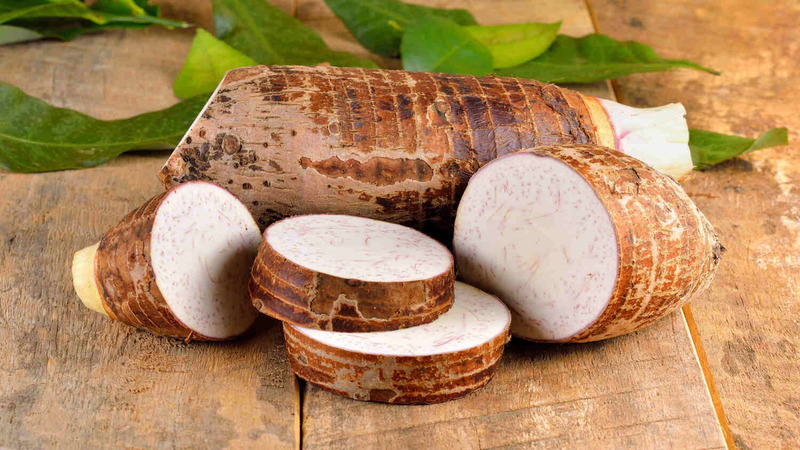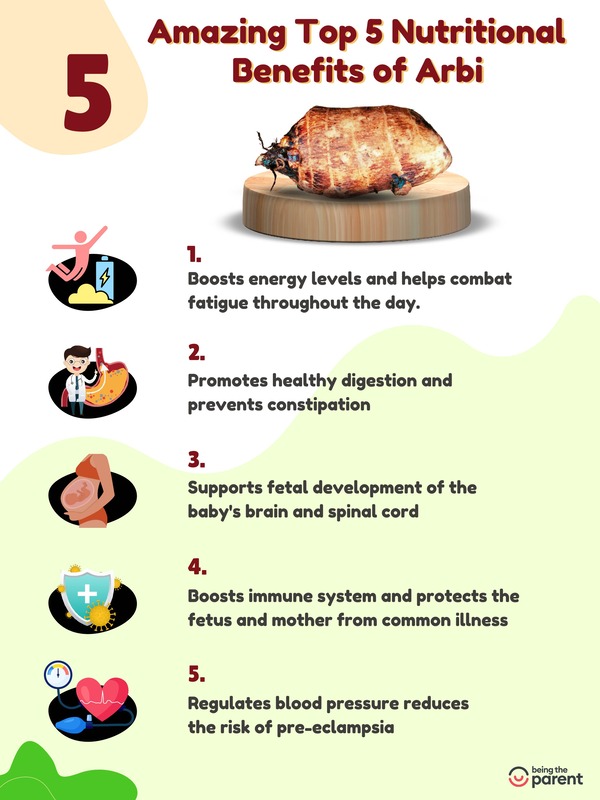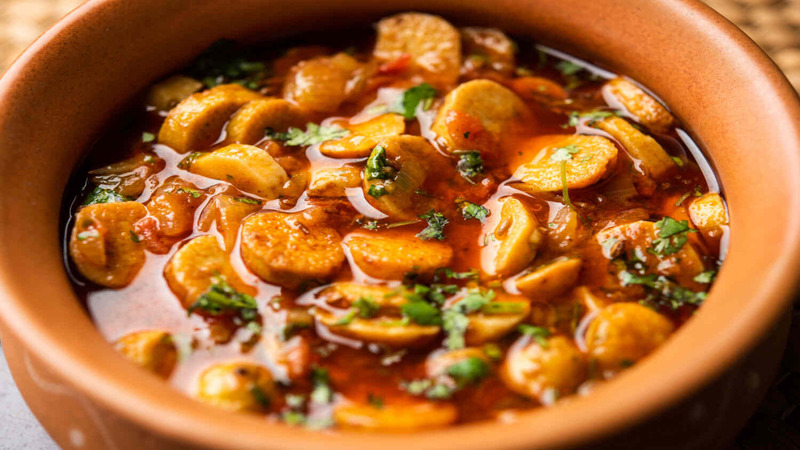
The journey of pregnancy is a thrilling time, full of joy and anticipation. Ensuring the health and well-being of both yourself and your baby is crucial, with nutrition playing a central role. Recently, the food Arbi, also known as Taro, has gained attention.
Taro has been enjoyed for centuries due to its unique taste and texture. When consumed in moderation, it can offer valuable nourishment. However, it’s important to be aware of both the benefits and potential risks of including Arbi in your diet during pregnancy. Understanding these aspects will help you make informed choices about your nutrition during this important time.
Video – Can You Eat Arbi During Pregnancy?
What is Arbi?
Arbi is a root vegetable, rich in vitamins, minerals, antioxidants, and fiber. It goes by the name taro root, and is a starchy root vegetable [1]. Arbi is brown in color with white pulp inside, and is available around the year as it is a perennial plant [2].
It is a nutritious and popular vegetable not just found in Indian traditional dishes but also in dishes across the globe [3]. The arbi plant has heart shaped green leaves and starchy bulb roots. The leaves have the flavor of cabbage, and the root is almost similar in taste to sweet potato [4].
Is It Safe To Eat Taro Root During Pregnancy?
Yes, it is safe to eat arbi in pregnancy when it is cooked thoroughly. It is important to consume arbi in moderation and ensure that it is cooked properly to avoid any possible health risks. Arbi or Taro is rich in fiber and provides anti-inflammatory and antioxidant properties [5].
Pregnant women should absolutely avoid raw or undercooked arbi. Arbi can be steamed, boiled, or fried. While it is ok to take arbi in small quantities, one must increase the intake of fluids to avoid the chances of constipation. Arbi contains certain allergic compounds harmful to expectant mothers. Hence, it is best advised to consult a health expert before adding this veggie.
Nutritional Value of Taro Root (Arbi)
Taro plant is a powerhouse of nutrients. Check out taro leaves and root nutrition facts. it is an excellent energy booster. It is also rich in dietary fiber. Let us find out Nutritional Value of Taro Root aka Arbi per 100gms [6]:-
| Nutrients | Amount |
| Water | 70.6 g |
| Energy | 112 kcal |
| Protein | 1.5 g |
| Fat | 0.2 g |
| Carbohydrates | 26.5 g |
| Dietary Fiber | 4.1 g |
| Calcium | 43 mg |
| Sodium | 11 mg |
| Potassium | 591 mg |
| Folate | 22 mg |
Amazing Top 6 Nutritional Benefits of Arbi

Arbi offers various nutritional benefits. It is a great source of vitamins, minerals, and dietary fiber. Some nutritional benefits of arbi are-
1. Rich in Vitamins
Arbi or taro root is rich in vitamins like vitamin C, which supports the immune system. It contains vitamin B6 which is essential for metabolism and the functioning of the nervous system.
2. Minerals
Arbi is a good source of potassium which is important for heart health and muscle function.
3. Low Calorie Count
Arbi is relatively low in calories so it is suitable for weight management, and can be an alternative for potatoes as well.
4. Energy Provider
It is a good source of energy as it is a starchy vegetable. Hence, consuming arbi is good for health.
5. Gluten-Free
Arbi is a safe choice when it comes to individuals with gluten sensitivity or celiac disease. Even during pregnancy if a woman is allergic to gluten, she can have arbi without any fear.
6. Dietary Fiber
Being rich in fiber, arbi aids in digestion and helps maintain bowel regularity. This is helpful for pregnant women who face constipation woes.
How to Consume Arbi in Pregnancy?

Consuming arbi in pregnancy can be a healthy addition to one’s diet. Some ways to consume arbi safely during pregnancy are-
- Ensure that arbi is always cooked thoroughly before eating. This helps to eliminate any harmful bacteria and makes it safe for consumption during pregnancy.
- First, peel the arbi and wash it thoroughly to remove any impurities or dirt.
- Steaming or boiling arbi is a safe way to cook it for a pregnant woman. This helps to retain the nutrients and makes arbi soft and easy to digest.
- Avoid eating raw arbi during pregnancy. It may contain toxins that can be harmful to both you and your fetus.
- Consume arbi in moderation as part of a well-balanced diet. Avoid excessive consumption of arbi.
- If you have any known allergies or sensitivities to arbi, it is best to consult with your doctor before eating arbi in pregnancy.
- Try to incorporate arbi into planned meals with a variety of other nutritious foods to ensure that you are getting a well-rounded diet during pregnancy.
Benefits of Arbi in Pregnancy

Arbi can provide many benefits when consumed during pregnancy. It is relatively a safe vegetable for pregnant women to consume. Some of the benefits of eating arbi vegetables in pregnancy are-
- Dietary fiber in arbi can help prevent constipation and support a healthy digestive system during pregnancy. Constipation is a common concern for many expectant mothers.
- Arbi is a rich source of essential nutrients like vitamins, minerals, dietary fiber, and other micronutrients.
- Arbi provides a steady source of energy because of its starch and carbohydrates content.
- Vitamin C in arbi can aid in strengthening the immune system which helps protect both the mother and her fetus from infections and illnesses.
- The potassium content in arbi can help maintain normal blood pressure levels and support heart health.
- Magnesium and potassium combination present in arbi is beneficial for proper muscle function and maintaining healthy bones during pregnancy.
- Arbi is low in calories and fat thereby making it a nutritious choice for expectant mothers who desire to manage their weight as well as obtain essential nutrients.
What Are The Risks of Eating Arbi during Pregnancy?
Though Arbi can offer various nutritional benefits during pregnancy, there are some potential risks associated with its consumption that you need to be aware of. These are-
- Some individuals may be allergic to arbi or related foods like yams and sweet potatoes.
- Despite its dietary fiber content, arbi may not suit everyone’s digestive system. One may experience gas, bloating, or other digestive discomfort.
- Arbi is a starchy vegetable and pregnant women with gestational diabetes or insulin resistance need to be cautious about consuming it
- Raw or improperly cooked arbi may contain calcium oxide crystals which can irritate the mouth and throat leading to digestive discomfort. It is vital to cook arbi thoroughly to break down these toxins.
Side Effects of Eating Arbi in Pregnancy

Arbi consumption during pregnancy may have some potential side effects, especially if it is not cooked properly. Some of the side effects of eating arbi in pregnancy are-
- Eating raw or undercooked arbi may cause irritation or itching.
- Arbi may be contaminated with harmful bacteria or pesticides. Proper washing and cooking are essential to minimize the risk of foodborne illness.
- Excessive consumption of arbi like any other food can lead to an imbalance in nutrient intake and potentially affect the overall pregnancy diet.
- Allergic reactions may range from mild symptoms like itching and hives to severe reactions like difficulty in breathing.
- Having arbi in excess may cause stomach upset or other digestive issues.
Taro or Arbi is an economical and nutritious veggie. When cooked properly and consumed in moderation, taro root during pregnancy can be safely included. It is crucial to understand potential allergies or sensitivities and seek advice from an expert before consumption.
FAQ’s
1. Is Arbi Better Than Potato?
Both arbi and potatoes are starchy vegetables with distinct taste and nutritional aspects. The context of nutritional needs and preferences will tip the scale in favor of either vegetable.
2. Is Arbi Difficult to Digest?
Arbi as such is not heavy or difficult to digest. But for people suffering from gastric issues, it may prove relatively difficult to digest.
3. Is Arbi Rich in Protein?
No. Arbi is not considered a significant source of protein. It is rich in other nutrients like vitamins, minerals, fiber, carbohydrates etc. but it does not contain a significant amount of protein.
3. Does Arbi Cause Constipation?
Arbi is generally considered to be a food that can help alleviate constipation rather than causing it. It benefits the gut health and is considered good for maintaining a good digestive system.
[Read Also: Yams During Pregnancy – Benefits And Side Effects]
References
- Sharma, S., Jan, R., Kaur, R., Riar, C.S. (2020). Taro (Colocasia esculenta). In: Nayik, G.A., Gull, A. (eds) Antioxidants in Vegetables and Nuts – Properties and Health Benefits. Springer, Singapore –
https://link.springer.com/chapter/10.1007/978-981-15-7470-_18# - Prajapati, Rakesh; Kalariya, Manisha; Umbarkar, Rahul; Parmar, Sachin; Sheth, Navin. Colocasia esculenta: A potent indigenous plant. International Journal of Nutrition, Pharmacology, Neurological Diseases –
https://journals.lww.com/ijnp/ - Kumar, Neeraj & Jangir, Naveen. (2021). Nutritious vegetable: Arbi (Taro: Colocasia esculenta). 16. 13 –
https://www.researchgate.net/publication/353702098 - Sharma, Seema & Jan, Romee & Kaur, Ramandeep & Riar, Charanjit. (2020). Taro (Colocasia esculenta). 10.1007/978-981-15-7470-2_18. – https://www.researchgate.net/publication/346576274
- Kaushal, P., Kumar, V. & Sharma, H.K. Utilization of taro (Colocasia esculenta): a review. J Food Sci Technol 52, 27–40 (2015) – https://link.springer.com/article/10.1007/s13197-013-0933
- Ferdaus MJ, Chukwu-Munsen E, Foguel A, da Silva RC. Taro Roots: An Underexploited Root Crop. Nutrients. 2023 Jul 27;15(15):3337. doi: 10.3390/nu15153337. Erratum in: Nutrients. 2024 Jun 21 –
https://www.ncbi.nlm.nih.gov/pmc/articles/PMC10421445/
